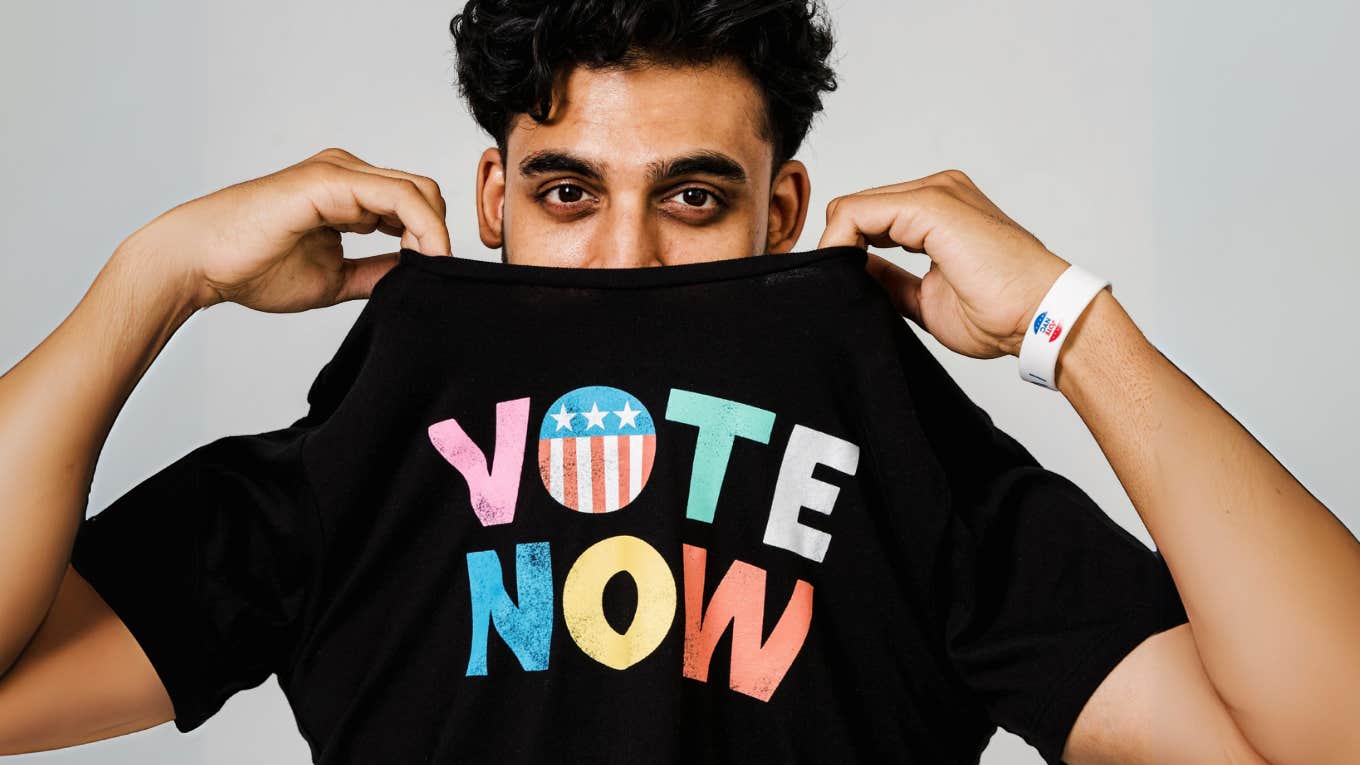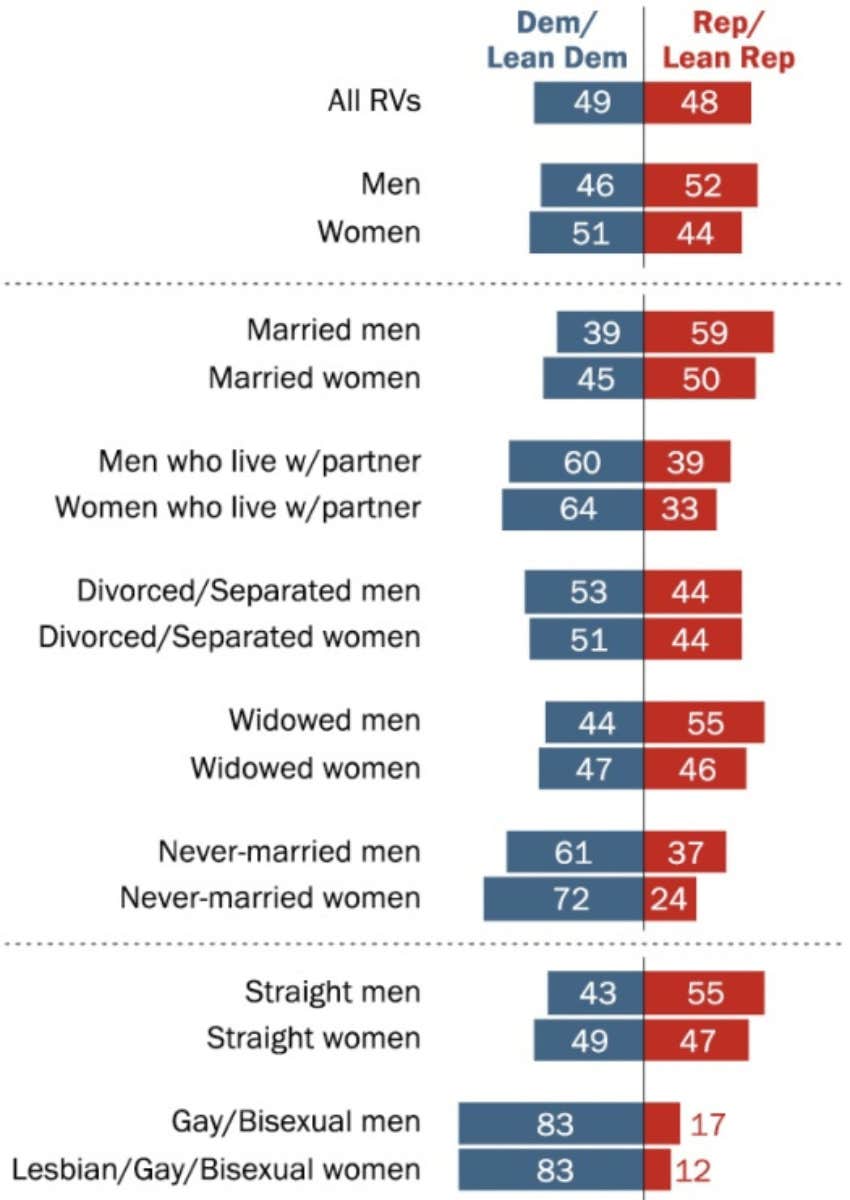The Political Party People Vote For Based On Marital Status, According To Research
Why do we so rarely hear about voters who are single in the barrage of polling results?
 Sora Shimazaki | Pexels
Sora Shimazaki | Pexels It is presidential election season in the US, and polling results are ubiquitous. Many polls from many different polling companies are released every day, and articles about polling results are often among the most popular stories on media websites.
Pollsters and reporters have their favorite categories, such as race, gender, religion, age, and education, along with various combinations of those categories, such as White evangelical Protestants or Black men. Rarely included in these polls is marital status. And yet, when political preferences are examined separately for people who are and are not married, the differences are striking and often greater than the differences for the categories that get all the attention.
Pew research report findings on the political party people favor based on marital status
Earlier this year, the Pew Research Center published a detailed report on the political party preferences of many different groups of registered voters in the US. They reported the percentage of registered voters who were Republican (or leaned Republican) and the percentage who were Democrats (or leaned Democrat) by race, ethnicity, gender, education, religion, age, income, home ownership, cohort (when they were born), parental status, sexual orientation, whether they lived in rural of suburban or urban communities, whether they belonged to a union, and whether they were veterans.
And, adding a category that is far too often missing from reports on voting, the Pew publication also documented political party preferences by marital status. From their most recent data, a national sample of more than 10,000 registered voters from 2023, they found that women who had never been married overwhelmingly described themselves as Democrats (or leaning Dem).
 Pew Research Center
Pew Research Center
The marital status groups favoring Democrats
Women who had never been married were far more likely to be Democrats, 72%, than Republicans, 24%. (Percentages do not always add up to 100 because they exclude the percentage of people who did not answer the question.)
Never-married women
72% Dem
24% Rep
The Pew Report did not publish findings separately for never-married women who were Black, but based on other data in the report, I think their preferences for Democrats would have been even more striking. For example, averaging over all marital status categories, Black women identify as Democrats by a margin of 84% to 10%.
Never-married men (averaged across racialized categories) are more often Democrats, too, but not by as wide a margin as the women, 61% vs. 37%.
Divorced or separated men and women are also more likely to be Democrats than Republicans, though again, not to the same degree as never-married men or women. For divorced men, 53% identify as Dem and 44% as Rep. For divorced women, the findings are almost the same: 51% Dem vs. 44% Rep.
The marital status group that most closely resembles the never-married people are the people who are cohabiting as a couple but are not married. The women identify more often as Democrats by 64% to 33% and the men by 60% to 39%.
The marital status groups favoring Republicans
The people most likely to identify preferentially as Republican are married men, 59% Republican vs. 39% Democrat. Married women more often identified as Republican, too, but by a smaller margin, 50% vs. 45%.
Married men
39% Dem
59% Rep
Widowed men are also likely to be Republican, 55% to 44%. Widowed women are different; they are a shade more likely to be Democrats, 47% to 46%.
 Sam Lion | Pexels
Sam Lion | Pexels
Marital status was included but also marginalized
I’m grateful to the Pew Research Center for including marital status in their research but disappointed that, in some ways, they marginalized it. For example, for some of the other categories of voters, they included results from past years, sometimes as far back as 1994. For marital status, only data from the most recent year was reported, and some of those data were only reported in supplementary tables at the end of the report.
Perhaps even more disappointing, the findings for marital status were not included in the important summary graphs showing “key groups where the Republican Party/Democratic Party has wide advantages.” For the Democrats, the groups were women with a college degree, urban, Hispanic, born in the 1990s, Asian, religiously unaffiliated, and Black. Never-married women were inexplicably missing, even though their 72% to 24% advantage to Democrats was wider than all of the groups that were included except Black registered voters, of whom 83% were Democrats and 12% Republican.
Curiously, never-married women were omitted from the summary graph when the graph showing wide advantages for the Republicans included the Latter-day Saints (Mormons), a group that did identify as Republican by a wide margin (75 to 23), but only accounted for 1% of the electorate. In contrast, the percentage of people 18 and older who are not married has been growing for decades; they now account for nearly half of all adults in the US.
Will pollsters and reporters start to pay more attention to marital status?
The first article I ever published about single people was an op-ed in the New York Times during the lead-up to the 2004 Presidential election. In “Sex and the Single Voter” (their choice of headline), I discussed voting patterns and also documented the condescending ways that the media and the two major political parties were talking about and trying to appeal to single women voters.
With the glaring exception of J. D. Vance’s snide comments about “childless cat ladies,” a group linked stereotypically to single women, I can’t think of much else by way of condescending quips about single women voters. Unfortunately, though, I think that’s primarily because they have been mostly missing from the conversation. And from the polling. If a close, enormously consequential election such as this one does not bring single women to the forefront, I don’t know what will.
Bella DePaulo (PhD, Harvard) is the author of the award-winning Single at Heart: The Power, Freedom, and Heart-Filling Joy of Single Life. She has been writing the “Living Single” blog for Psychology Today since 2008 and her TEDx talk, “What no one ever told you about people who are single,” has been viewed more than 1.7 million times.

